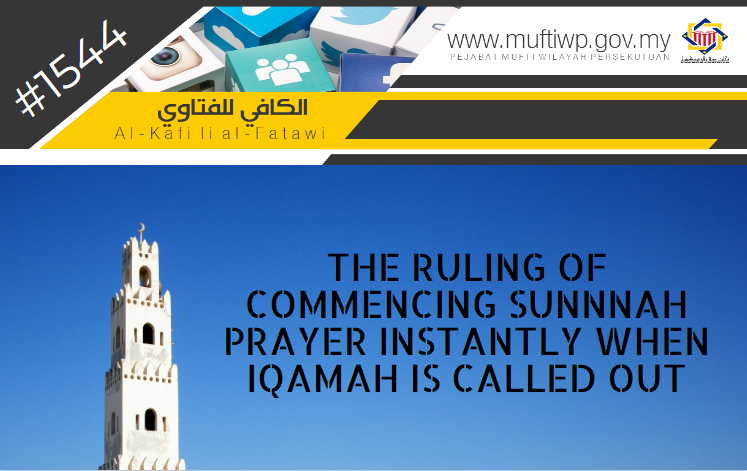Question:
Assalamualaikum. If I am a bit late to perform the sunnah Subh prayer, is it permissible for me to perform it instantly when the muaddhin called out the iqamah?
Answer:
Alhamdulillah, praise and thanks to Allah for the countless blessings He has blessed us all with. Blessings and salutations to the Prophet Muhammad PBUH, his wives, his family, companions and all those that follow his teachings to the day of judgement.
Sunnah prayers preceding Subh prayer are among rabithah sunnah which is highly encouraged to be performed. This is based on a hadith narrated by Aisha R.Anha where she said that the Prophet PBUH said:
رَكْعَتَا الْفَجْرِ خَيْرٌ مِنَ الدُّنْيَا وَمَا فِيهَا
The two rak'ahs at dawn are better than this world and what it contains.
Sahih Muslim (725)
The above hadith clearly indicates on the virtue of performing sunnah prayer before Subh is immense and it is a commandment for us as Muslims to preserve this ibadah. In fact, Ummu al-Mu’minin Aisha RA: “I never saw the Prophet PBUH hasten in performing any sunnah prayer other than two rak’ahs before Subh”.
Coming back to the presented question, we state that it is thabit on the prohibition from shara’ for a person to commence sunnah prayer right after obligatory prayers are performed. This is based on a hadith narrated by Abu Hurairah RA where the Prophet PBUH said:
إِذَا أُقِيمَتِ الصَّلاَةُ فَلاَ صَلاَةَ إِلاَّ الْمَكْتُوبَةُ
When the prayer commences, there is no prayer but the obligatory one.
Sahih Muslim (710)
So, based on the above hadith, it is understood by two meanings which are when the imam has commenced prayer or when iqamah is called out, then it is makruh to start any sunnah prayer, whether rabitah or others. This is because, performing the obligatory is prioritised.
Imam al-Nawawi rahimahullah in commenting on this issue said:
ولا يبتدىء نفلا بعد شروعه فيها
And it is not acceptable for a person to start sunnah prayer instantly when (the muaddhin) starts calling out the iqamah. Refer Minhaj Al-Thalibin, Al-Nawawi (pg. 41).
Dalil which indicates that the prohibition of performing sunnah prayer instantly after completing obligatory prayer leads to makruh ruling and not haram, is based on a hadith narrated by Abdullah bin Malik bin Buhainah RA, he said:
أَنَّ رَسُولَ اللَّهِ صلى الله عليه وسلم مَرَّ بِرَجُلٍ يُصَلِّي وَقَدْ أُقِيمَتْ صَلاَةُ الصُّبْحِ فَكَلَّمَهُ بِشَىْءٍ لاَ نَدْرِي مَا هُوَ فَلَمَّا انْصَرَفْنَا أَحَطْنَا نَقُولُ مَاذَا قَالَ لَكَ رَسُولُ اللَّهِ صلى الله عليه وسلم قَالَ قَالَ لِي يُوشِكُ أَنْ يُصَلِّيَ أَحَدُكُمُ الصُّبْحَ أَرْبَعًا
The Messenger of Allah (ﷺ) happened to pass by a person who was busy in praying while the (Fard of the) dawn prayer had commenced. He said something to him, which we do not know what it was. When we turned back we surrounded him and said: What is it that the Messenger of Allah (ﷺ) said to you? He replied: He (the Holy Prophet) had said to me that he perceived as if one of them was about to observe four (rak'ahs) of the dawn prayer.
Sahih Muslim (711)
So, this hadith indicates, if the action is haram, surely the Prophet PBUH will prohibit it and command the man to suspend his prayer. So, the ruling changes originally from haram to makruh in this issue.
Closing
As a conclusion, our say is that the ruling of a person commencing sunnah prayer instantly when iqamah is called out is makruh, whether it is among rabitah sunnah prayers or others. Also, if you are a person who frequent the subh sunnah prayer, but then in some circumstances, you perform it late and subh prayer is commenced, then it is possible for you to perform the qabliyyah sunnah prayer after the subh prayer is performed. This is because this action is thabit from the Prophet PBUH that he also did likewise.
However, if one is already praying the sunnah prayer, then iqamah is called out, then it is permissible for him to continue his prayer if he is not worried of missing (the time for) the congregational prayer. This is as mentioned by Imam al-Nawawi:
فإن كان فيه أتمه إن لم يخش فوت الجماعة
If he is already inside of it (sunnah prayer), he shall complete it if he is not worried about missing the congregational prayer. Refer Minhaj Al-Thalibin, Al-Nawawi (Hlm. 41).
Lastly, we pray to Allah SWT to give us true understanding to us all in the religion. Ameen.


